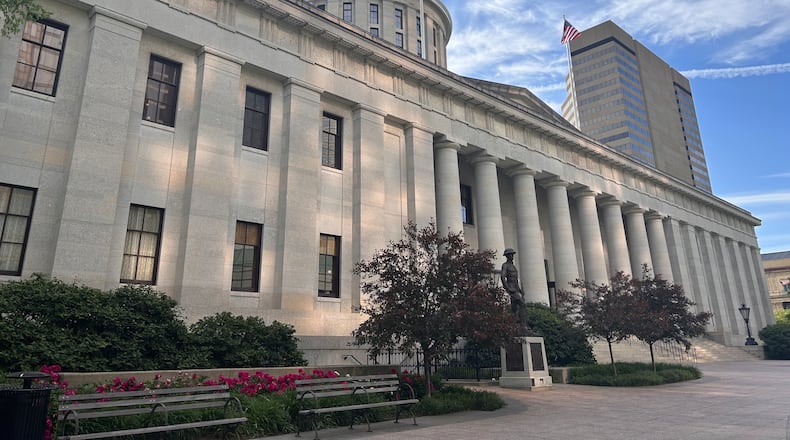On Tuesday, Warren County Auditor Matt Nolan — representing the County Auditor’s Association of Ohio — cautioned against allowing a “knee jerk” reaction. He told the committee his colleagues Franklin County Auditor Michael Stinziano and Ottawa County Auditor Jennifer Widmer were correct in testifying HB 187 would be bad law.
“Auditor Stinziano and Auditor Widmer eloquently laid out the implications and the challenges in artificially adjusting a century-long process of valuation in a knee jerk reaction to the current real estate market,” Nolan said. “Abandoning the well-established standards of mass appraisal and replacing them with the provisions of H.B. 187 would create significant discrepancies in equity and diminish the trust that our residents have in the valuation process.”
The state tax commissioner’s recommended value increases that were based largely on sales data from 2022, which local officials say were unfairly skewed by pandemic-induced inflation and other ill effects of the historic crisis. The new law would require an equally weighted three-year average and give local auditors more control in the reevaluations.
Widmer testified that in her county at least, home prices have remained steady throughout the pandemic and 2023 is following suit so far, “it has looked consistently this way since about 2020.” She called it “the new normal.”
Sen. George Lang, R-West Chester Twp., who introduced the language as an amendment to the Senate budget and representatives Thomas Hall, R-Madison Twp. and Adam Bird of Clermont County — who authored HB 187 — have all said this measure is merely a “band-aid” to staunch the bleeding of the huge value increases this year. Other long-term measures to address property taxes are critical.
Stinziano told the committee members they figured out the impact of HB 187 on homes valued at $200,000 in three taxing districts that were below, at, and above the countywide average in his county and the largest tax savings under the bill in their study sample would be $401 and highest increase was $154.
“Artificially lowering taxable property values in the current cycle does not obtain a similar amount of tax relief and would undermine the core basis of property taxation — that a property should be taxed based on its actual value,” he said adding, “I am incredibly concerned about the increased tax burden on those who become house rich and cash poor, but this proposal will neither change how taxes are calculated nor provide relief for those who are burdened despite the significant changes in values that would come with this bill.”
Hall and Rep. Adam Mathews, a Republican from Lebanon, asked the auditors whether the three-year average would “smooth” the value fluctuations, providing smaller increases.
“Does this bill smooth out as written or does it extend the pain into the future for someone else to deal with?” Mathews said.
Nolan said it would smooth it, but that sets “dangerous precedent” because “you’re taking the value increases that should be felt today and pushing them into the future.”
“That’s a dangerous precedent to make and frankly has no basis in the valuation process that’s done throughout this country. It’s just picking a subjective timeframe and say we’re going to use three years and we’re going to flatten that curve down,” Nolan said. “That gets very dangerous when we have different markets. We’re looking at today’s market, our system right now keeps us in the present, what’s being proposed puts us in the past and that’s a dangerous place to be in when we don’t know what it’s going to be in the future.”
The bill also gives more power to county auditors because the proponents say they are more familiar with their respective markets than an “unelected bureaucrat” in Columbus. Rep. Steve Demetriou, R-Bainbridge Twp., asked the auditors how they felt about that provision.
Nolan said “this is bad legislation” because they need the Department of Taxation as a check on elected officials, but he conceded “we need to find ways to ensure there are checks on the Department of Taxation.”
“Auditors are elected officials, we are subject to votes and so by allowing the county auditors to have full control over the process you would subject it to subjectivity by auditors at a time of elections,” Nolan said. “There’s no doubt about that.”
The three auditors agreed with the proponents who testified last week — seven in-person and two submitted written testimony — that this is a tax problem and not really a value issue. HB 187 isn’t going to pass before the legislature goes on summer break next week but Lang’s amendment might still change the law.
Butler County Commissioner Don Dixon, who issued the “call to action” to local leaders and state lawmakers when the value hikes were announced, told the Journal-News the bill isn’t dead.
“Hopefully the other one stays in the budget and we get it done that way,” Dixon said. “But they can always use this bill now as it’s presented to add to it and amend it so they can modify the whole process of tax assessment. Use it to carry some changes that would be pertinent.”
About the Author

